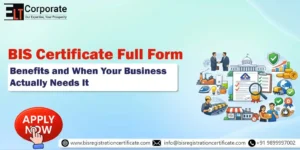Did you know that there are strict safety and quality rules for bottled water dispensers to ensure consumer health and safety? These rules are in place to protect people’s health, mainly because these dispensers are found in many offices, homes, and public areas. They must meet these quality standards.
However, manufacturers often struggle to understand the complicated rules needed to get BIS certification for bottled water dispensers, which are required to sell their products in India. Hence, this article will break down the BIS certification process for bottled water dispensers, from the necessary paperwork to testing methods. We’ll highlight why following these rules is essential. By meeting BIS standards, manufacturers ensure safety, build customer trust, and reach more people with their products.
Quality Control Order For Bottled Water Dispensers
The Quality Control Order (QCO) for bottled water dispensers establishes specific standards that must be followed. It details the required specifications for manufacturers, including the safety of materials, performance standards, and hygiene protocols.
The MINISTRY OF COMMERCE AND INDUSTRY (Department for Promotion of Industry and Internal Trade), in consultation with the Bureau of Indian Standards, has issued a Quality Control Order making BIS certification mandatory for bottled water dispensers. This Order was officially published on June 3, 2024.
- This Order shall be called the Bottled Water Dispensers (Quality Control) Order, 2024.
- It will take effect on the date of its publication in the Official Gazette.
Implementation Dates for the QCO
- For foreign manufacturers or importers: July 1, 2024
- For small manufacturers: October 1, 2024
- For micro manufacturers: January 1, 2025
Also Read: How To Get BIS Certification For Packaged Drinking Water
Why Is BIS Certification Important For Consumer Safety In Bottled Water Dispensers?
Here listed why obtaining BIS certification for bottled water dispensers plays a crucial role in ensuring safety and quality:
- Safety Assurance: the BIS certificate ensures that the materials used in the dispensers are safe and do not leach harmful substances into the water. This means you can trust that the water you’re drinking is free from contaminants that could affect your health.
- Quality Standards: the certification process involves rigorous testing against predefined quality standards. This means that products are evaluated for performance and reliability, ensuring they meet specific benchmarks. When you see the BIS mark, it’s a good sign that the product has passed these tests.
- Consumer Trust: A BIS certification for the product helps build consumer trust. When people know a product is certified, they feel more confident in its safety and quality.
- Regulatory Compliance: obtaining a BIS mark on the bottled water dispenser certification indicates that it follows Indian regulations, which is essential for protecting consumer rights. It also ensures that companies are held accountable for the quality of their products.
- Market Differentiation: For manufacturers, having a BIS certification can set their products apart from competitors. It shows that they prioritise quality and safety, which can be a selling point for increasingly health-conscious consumers.
Therefore, getting BIS certification for water dispensers or any other products will help ensure that products are safe, reliable, and of high quality. So, look for that BIS mark next time you choose a dispenser.
Also Read: BIS Certificate For Domestic Water Meter
How Does BIS Certification Affect The Operations Of Bottled Water Dispenser Manufacturers?
BIS certification significantly affects bottled water dispenser manufacturers by applying strict quality control measures, ensuring that products meet safety standards. While obtaining certification involves costs for testing and compliance, it enhances credibility and consumer trust, making it easier to access the Indian market.
Manufacturers may also need to invest in research and development to meet these standards, which can improve product quality. Additionally, ongoing compliance requires regular audits and updates, helping maintain high operational standards. Ultimately, BIS certification provides a competitive advantage by differentiating certified products in a crowded marketplace.
Also Read: Get ISI certification for mineral water plant
Steps To Obtain BIS Certification For Bottled Water Dispensers
You must follow multiple steps to get a BIS certificate for bottled water dispensers. Below mentioned is a detailed breakdown of the process:
- Know the Standard: to get a BIS mark for your product, know the correct BIS standards for bottled water dispensers. These standards cover safety, performance, and quality aspects. You can find the relevant standards on the BIS website.
- Prepare Your Product: Ensure your bottled water dispenser meets all the terms mentioned in the BIS standards.
- Documentation: before filing the application form, gather all the required documents, such as product details, technical specifications, quality assurance processes, etc.
- Apply for Certification: Once you’ve compiled all the required documents, fill out the application form for a BIS license. Depending on the BIS office’s processes, you can submit this online or in person.
- Factory Inspection: BIS will conduct a factory inspection of your manufacturing unit after the application submission. They’ll check your production processes, quality control measures, and overall compliance with the standards. Make sure everything is in order.
- Product Testing: the dispenser must undergo testing in a BIS-approved laboratory. They’ll evaluate its performance based on the standards. Be prepared for this step, as it’s crucial for certification.
- Review and Approval: Once testing is complete and everything checks out, BIS will review your application and test results. They’ll approve your BIS certification for bottled water dispensers if everything is satisfactory.
What Are Common Mistakes Manufacturers Make During BIS Certification Process?
The common mistakes manufacturers make during the BIS registration process are incomplete paperwork, ignoring product rules, or picking testing labs that aren’t recognized, which can lead to rejection.
Remember, skipping the pre-assessment can cause problems to go unnoticed, and not following local regulations can create issues with compliance. Also, underestimating how long the certification process will take can lead to unnecessary stress. Therefore, by being aware of these mistakes and preparing well, you can make the process of BIS certification for bottled water dispensers smoother.









